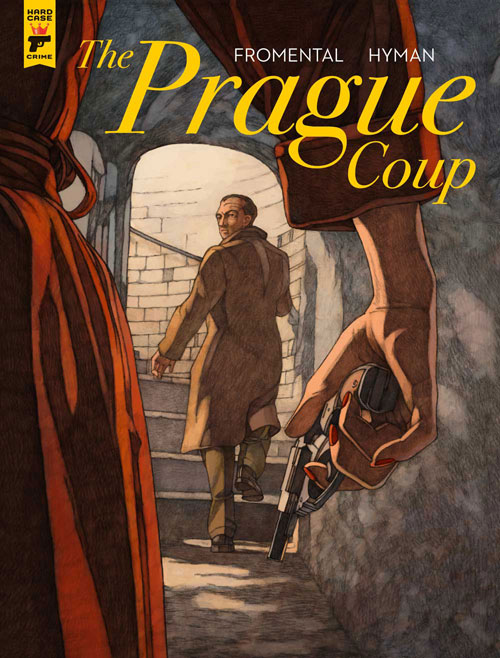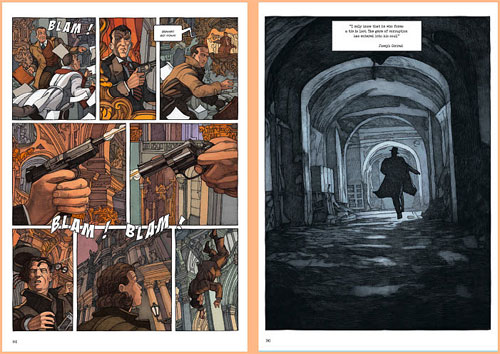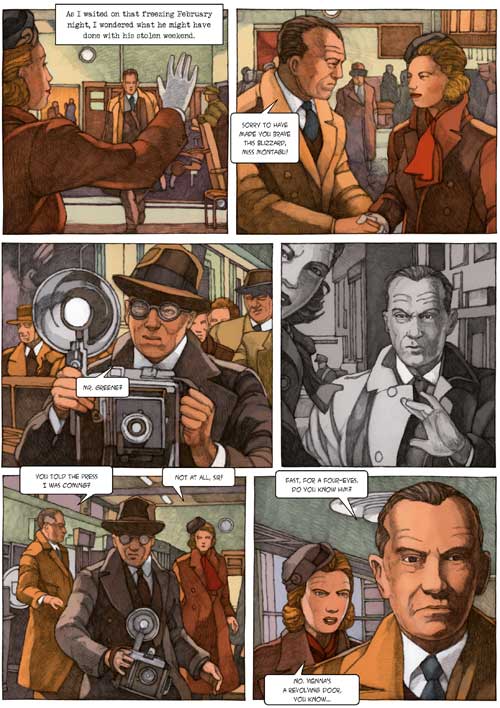Fact Over Fiction Dictates The Prague Coup
Jun 08, 2018
 |
Ahead of its much-anticipated release this December, The Prague Coup writer Jean- Luc Fromental and co-writer/artist Miles Hyman give us a sneak peek at this very personal project. Why choose to investigate the story behind Orson Welles’ The Third Man? Was Graham Greene, the author and spy, a hero or villain? And is fact really stranger than fiction?
**********
Titan Comics: How did the two of you first meet, and have you worked together previously?
Jean-Luc Fromental: Miles and I have known each other for over 30 years. I first met him shortly after he got to France from the States. I wrote a short portrait of him for the first catalogue of his French advertising agent, Prima Linea, in 1989. Then we really started collaborating. I see him as a master of contradictory signals, slick and clean yet profound and perverse, and this, in terms of narration, is a very attractive quality.
Miles Hyman: As a young illustrator who was just starting out in Paris in the late 1980’s, Jean-Luc was one of the first established writers I had the incredible luck of working with. We’ve come to know one another very well and share a range of common interests – literature, history, cinema and popular culture to name a few. As a result we are able to take on a fairly wide range of topics and genres – from children’s books to the sort of complex universe we explore in our latest venture, The Prague Coup.
Titan Comics: What inspired you to tell the story of The Prague Coup?
Jean-Luc Fromental: Several combined factors as in most of these projects. First of all, the opportunity. I adore espionage; I'm a devoted reader of the genre, from the James Bond of my teens to the more recent Le Carré. Conrad's Secret Agent (which Miles brilliantly illustrated) is one of my favorite books ever. And of course, I have always been a massive fan of Graham Greene. He was a prankster, a drunk, a cheat, a master of cruel jokes, a cynic, a converted Catholic and above all, a spy. I decided to use the fortnight he spent in Vienna in February 1948, researching the film The Third Man he was commissioned to write for producer Alexander Korda and director Carol Reed, and lace it with a spy intrigue that would hopefully echo the one in this fantastic post-war British thriller.
Miles Hyman: I’ll admit I sort of followed Jean-Luc’s lead on this one. As soon as he mentioned the underlying idea of The Prague Coup, I could tell that my friend had found a powerful narrative thread and I was hooked! Of course I had read Greene (though not as widely as Jean-Luc) and loved the film The Third Man. Like Jean-Luc I’m a fan of spy fiction and the sort of noir atmospheres that I knew would be central to our story.
Titan Comics: Would you classify this more as an historical graphic novel or as a work of fiction?
Jean-Luc Fromental: I'd say fiction above all. But for me, fiction nowadays has to touch many different subjects and levels to be of any interest. So there are historical facts in the story, of course, since it's set at the dawning of Cold War, just before the Iron Curtain falls across Europe. Our comic is also a wink and a tip of the hat to two other major narrative art forms, literature and cinema. It's a fake biopic, a strange mixture of established facts (regarding Greene's relations with MI6 for example) and plain invention. Above all, it's an homage to a writer who escorted me all my life, leading me to the best of British Literature, from Stevenson to Conrad, to Waugh, to many many others.
Miles Hyman: As Jean-Luc says, our story is built on both history and fiction, and we certainly benefited from a period so rich in remarkable details that it has become a fertile breeding-ground for all sort of storytelling. I love the way Jean-Luc’s story weaves in and out of historical events, melding them with fiction so as to make all of these moving parts work together seamlessly. I drew inspiration from his approach in blending authentic people and places with imagined ones, building on fact to create a new, imagined sequence of visual events.
Titan Comics: The Prague Coup tells the story behind Graham Greene and Orson Welles' The Third Man. What are the pros and cons of using situations and people that readers are already familiar with?
Jean-Luc Fromental: The main difficulty is never to insult your character. We could not very well turn poor Graham, a merry drinker, a brave and sometimes bipolar war correspondent, but basically a peaceful writing man, into some kind of Jason Bourne. But that's the good thing with spy stories. You can have ladies and gents sitting, talking, and lunching very politely together while doing as much damage as they would with live ammo. That's for the cons. The pros are innumerable. The richness of the material, the fact that our narrator took the pain of writing at length about the brief but intense relations she had with old Graham while guiding him through the streets and secrets of 1948 Vienna. The fact that the film itself brought many clues and cues to Miles for his magnificent rendition of the bombed destitute imperial city. So many things that made the joys of this delightful collaboration.
Miles Hyman: From a visual perspective, the principal challenge on my end was bringing a well-known author to life in a plausible way as a living, breathing character in a graphic novel. I think the danger here would have been to try and recreate a photographic likeness of Greene throughout, perhaps making him seem overly stiff and too heavily-documented. I felt that this approach would have weighed down the narrative for the reader who would have been inclined to recognize the historical Graham Greene on every page rather than the semi-fictional character he has become in our book. I was intent on creating an authentic rendering of post-war Vienna but generally set my priorities on the drama and intensity of the story’s scenes rather than an explicit rendering of every historical detail.
Titan Comics: Artistically, how did you approach this project? Did it require something particular to capture the mood and tone?
Jean-Luc Fromental: For me it required months of reading and re-reading. Tons of books by and about Graham Greene, plus truckloads of non-fiction regarding the intricacies of the WW2 period and early Cold War. When you work with an existing figure that spent his life lying about himself, it's sometimes difficult to find the dose of truth you need to make him "real," or at least credible.
Miles Hyman: Like Jean-Luc I spent a great deal of time looking at documents, hoping to respect the script’s fact-based fiction with images that play by the same general rules. I re-read Greene’s novels; I watched The Third Man countless times, reviewing scenes for costumes, locations and hidden details. But I also visited Vienna itself, where most of the action takes place. The result feels to me like some of my very best work and I’m thrilled to have been able to work with Jean-Luc on this story that holds such tremendous importance for him and now, as a result of our shared adventure, for me as well.
 |
 |




